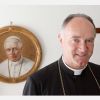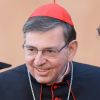Uniting a diverse flock
ROME - Pentecost is a feast of unity, as the gift of the Holy Spirit makes possible the unity that the Lord Jesus desires for His Church. To preserve the unity of the Church is one of the first duties of the pastor. The flock is to be brought into the one sheepfold. Yet that remains a very difficult and delicate task. Two current examples, much discussed in Rome these days, point to different approaches.
Consider first the Anglicans. For the better part of 40 years there have been significant numbers of Anglicans looking Romeward, particularly after the unilateral decision in the Anglican Communion in the 1970s to ordain women, something never done by either the Catholic or Orthodox Churches. Many thought that such a unilateral rupture of common sacramental practice meant a definitive abandonment of the ecumenical path by the Anglican Communion, and therefore some measure should be adopted by Rome to make it easier for Anglicans to become Catholic while preserving something of their ecclesial communities and liturgical heritage. The Holy See took rather a different view. While provision was made for individual Anglican clergy, and individual Anglican lay people could always become Catholic in the normal fashion, there was no provision for groups to enter full communion together.
ROME - The Catholic Church's relationship to Judaism as taught by the Second Vatican Council and the interpretations and developments of that teaching by subsequent popes, "are binding on a Catholic," said the Vatican official responsible for relations with the Jews.
Swiss Cardinal Kurt Koch, president of the Pontifical Commission for Religious Relations with the Jews and a member of the Congregation for the Doctrine of the Faith, spoke to reporters May 16 after delivering a speech on Catholic-Jewish relations in light of Vatican II's declaration "Nostra Aetate" on the church's relations with non-Christian religions.
VATICAN CITY - In what the Vatican described as an encouraging "step forward," the traditionalist Society of St. Pius X has revised its response to a Vatican document laying out certain basic doctrinal principles and criteria for interpreting church teaching.
The latest response submitted by Bishop Bernard Fellay, superior general of the society, arrived at the Vatican April 17. It will be examined by the Congregation for the Doctrine of the Faith and then "placed under the judgment of the Holy Father," said a brief communique from the Pontifical Commission "Ecclesia Dei," which is handling the Vatican's discussions with the SSPX.
VATICAN CITY - The Congregation for the Doctrine of the Faith, with the approval of Pope Benedict XVI, has defined as "insufficient" the position of the traditionalist Society of St. Pius X on certain basic doctrinal principles and criteria for interpreting church teaching.
U.S. Cardinal William J. Levada, prefect of the doctrinal congregation, met for two hours March 16 with Bishop Bernard Fellay, superior of the society, to explain the Vatican's evaluation of the position of the SSPX, said Jesuit Father Federico Lombardi, Vatican spokesman.





